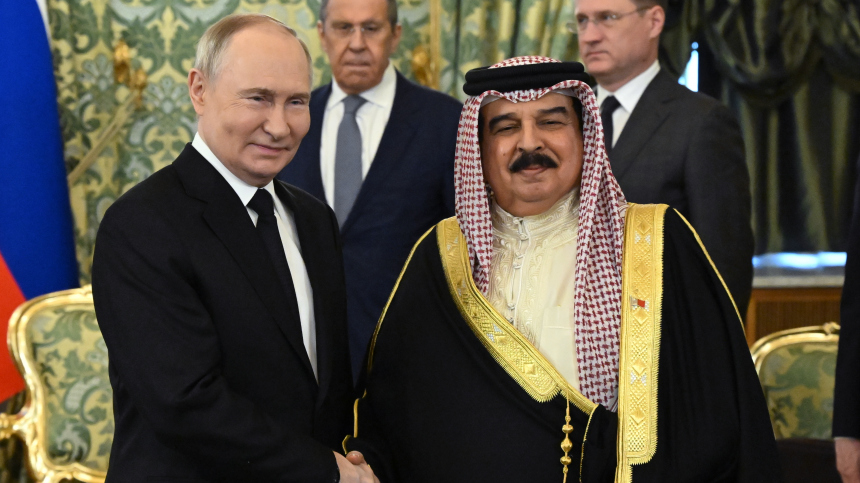Bahrain-Russia Ties: Pivotal Diplomacy Unveiled
A recent official visit by the King of Bahrain to Russia has shed light on the strengthening relations between the two nations, encompassing trade, cultural exchange, and political collaboration on international issues.
Published May 24, 2024 - 00:05am

Image recovered from 5-tv.ru
Chechen leader Ramzan Kadyrov recently met with Bahrain's King Hamad bin Isa Al Khalifa and Crown Prince Nasser bin Hamad bin Isa Al Khalifa in Moscow, discussing the strong relationship between Russia and Muslim communities. King Hamad's visit to Russia, his fourth since ascending the throne, is symbolic of the deepening ties between the two nations, underpinned by nearly 35 years of diplomatic relations. Russian President Vladimir Putin and the Bahraini monarch engaged in talks aimed at boosting bilateral trade, exploring investment opportunities, cultural exchange programs, and collaborating on crucial international matters, including the Middle East's precarious dynamics.
King Hamad, during his meeting with Putin, expressed hopes for an international conference to address the Palestinian issue, seeking Russia's influential support. Trade between the countries, while described by Putin as symbolic, shows a promising trend, with 30 significant projects amounting to approximately 500 million dollars. The cultural domain, including plans for hosting Bahrain Days in Russia and the subsequent Russian Seasons in Bahrain, highlights the cultural diplomacy at play.
King Hamad's readiness to host critical peace negotiations, including an international conference aimed at resolving the Palestinian conflict, suggests his country's emerging role as a neutral venue for international dialogues. Moreover, Bahrain's balanced diplomatic approach is marked by maintaining cordial relations with both East and West, underpinned by its strategic location in the Middle East and its relationship with global powers such as the US, Russia, and China.
The official visit's significance extends beyond bilateral interests, with implications for international issues like the Palestinian-Israeli conflict. The leaders reiterated the need for substantial diplomatic action to achieve a two-state solution, reflecting a shared commitment towards regional stability and peace.
Chechen leader Ramzan Kadyrov recently met with Bahrain's King Hamad bin Isa Al Khalifa and Crown Prince Nasser bin Hamad bin Isa Al Khalifa in Moscow, discussing the strong relationship between Russia and Muslim communities. King Hamad's visit to Russia, his fourth since ascending the throne, is symbolic of the deepening ties between the two nations, underpinned by nearly 35 years of diplomatic relations. Russian President Vladimir Putin and the Bahraini monarch engaged in talks aimed at boosting bilateral trade, exploring investment opportunities, cultural exchange programs, and collaborating on crucial international matters, including the Middle East's precarious dynamics.
King Hamad, during his meeting with Putin, expressed hopes for an international conference to address the Palestinian issue, seeking Russia's influential support. Trade between the countries, while described by Putin as symbolic, shows a promising trend, with 30 significant projects amounting to approximately 500 million dollars. The cultural domain, including plans for hosting Bahrain Days in Russia and the subsequent Russian Seasons in Bahrain, highlights the cultural diplomacy at play.
King Hamad's readiness to host critical peace negotiations, including an international conference aimed at resolving the Palestinian conflict, suggests his country's emerging role as a neutral venue for international dialogues. Moreover, Bahrain's balanced diplomatic approach is marked by maintaining cordial relations with both East and West, underpinned by its strategic location in the Middle East and its relationship with global powers such as the US, Russia, and China.
The official visit's significance extends beyond bilateral interests, with implications for international issues like the Palestinian-Israeli conflict. The leaders reiterated the need for substantial diplomatic action to achieve a two-state solution, reflecting a shared commitment towards regional stability and peace.
Furthermore, the Russia-Bahrain dialogue reflects an understanding of the multifaceted nature of international relations today where economic partnerships are intertwined with geopolitical strategy and cultural exchange. Such meetings are representative of a more interconnected world where the Gulf States are increasingly active in seeking diplomatic ties that extend beyond their traditional alliances.
During the visit, Russia and Bahrain also discussed the latest developments in the energy sector, an area of mutual interest and expertise. As major oil-producing nations, their cooperative efforts could lead to advancements in sustainable energy and economic security, against the backdrop of fluctuating global oil prices and the push towards renewable energy sources.
Other important topics included discussions about security cooperation and counterterrorism efforts, as both nations have vested interests in combating the spread of extremism. Collaboration in intelligence sharing, cybersecurity, and the development of advanced defense systems could likely benefit the security infrastructure of both countries.
The Moscow meeting is expected to pave the way for increased Russian influence in the Middle East through strategic alliances with key nations like Bahrain. This influence is not only economic or political; Russia also seeks to establish a solid foothold culturally by promoting Russian language and cultural values within the region as part of their soft power strategy.
A section of the agreement was also dedicated to education with potential academic exchanges and scholarships for Bahraini students to study in Russia, which would contribute to a deeper understanding and bounding between the populations of the two nations. This focus on education underscores an investment in the future relationship between Bahrain and Russia, rooted in mutual respect and knowledge sharing.
The involvement of Chechen leader Ramzan Kadyrov in these discussions with the Bahraini royal family is particularly noteworthy. Kadyrov's role signifies Russia's use of regional leaders to strengthen diplomatic and economic ties within the Middle East, showcasing the diverse tapestry of Russia's approach to international relations.
Overall, the visit of King Hamad bin Isa Al Khalifa to Moscow could be seen as a harbinger of closer ties not just between Bahrain and Russia but possibly indicating a shift in Middle Eastern geopolitics. As global dynamics continue to evolve rapidly, the importance of such high-level meetings in shaping the future of international relations cannot be overstated. The outcomes of this visit—ranging from cultural exchanges to defense cooperation—highlight the multifaceted approach required to foster long-term partnerships in the 21st century.







